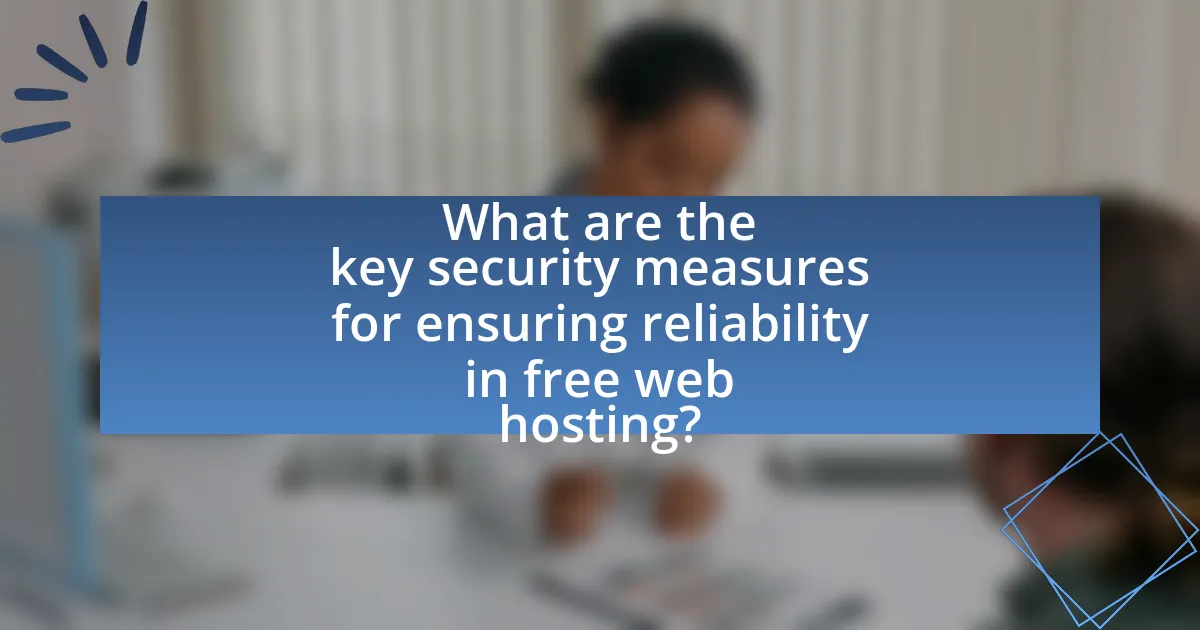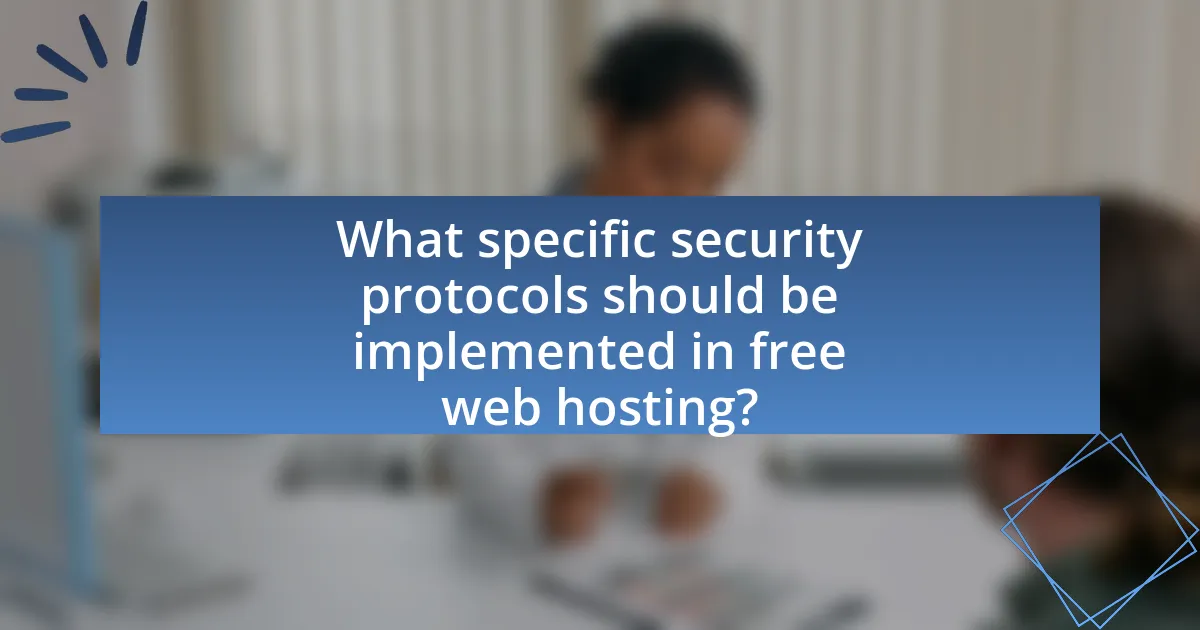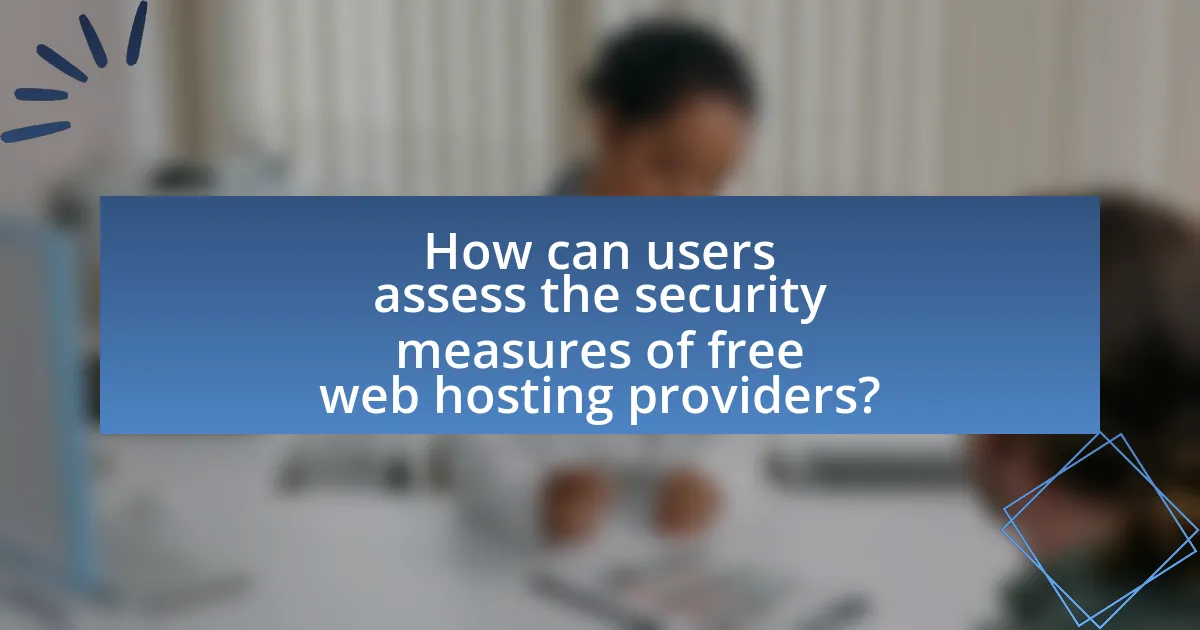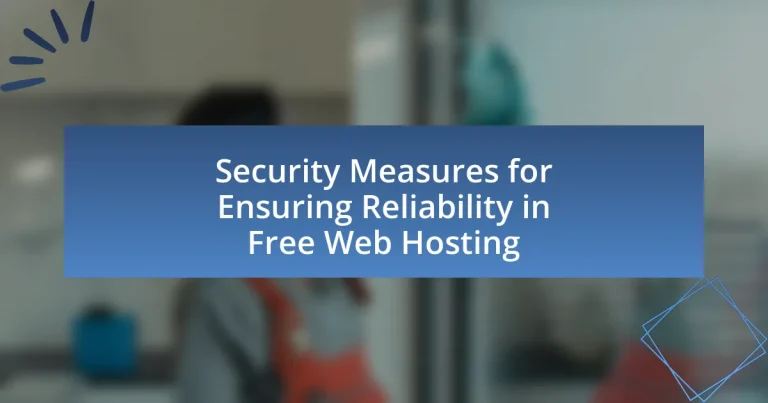The article focuses on key security measures essential for ensuring reliability in free web hosting services. It outlines critical practices such as regular software updates, strong password policies, data encryption, and robust backup solutions that collectively enhance security and protect user data from various threats, including data breaches and malware infections. Additionally, the article emphasizes the importance of reliability in free web hosting, detailing how it impacts user experience and website performance. Specific security protocols, including SSL encryption and firewalls, are discussed, along with best practices users can adopt to further enhance their security.

What are the key security measures for ensuring reliability in free web hosting?
Key security measures for ensuring reliability in free web hosting include regular software updates, strong password policies, data encryption, and robust backup solutions. Regular software updates protect against vulnerabilities by patching known security flaws, while strong password policies prevent unauthorized access through complex and unique passwords. Data encryption safeguards sensitive information during transmission and storage, making it unreadable to unauthorized users. Additionally, implementing robust backup solutions ensures that data can be restored in case of loss or corruption, maintaining service continuity. These measures collectively enhance the security posture of free web hosting services, thereby improving reliability.
How do these security measures protect user data?
Security measures protect user data by implementing encryption, access controls, and regular security audits. Encryption secures data during transmission and storage, making it unreadable to unauthorized users. Access controls restrict data access to authorized personnel only, reducing the risk of data breaches. Regular security audits identify vulnerabilities and ensure compliance with security protocols, thereby enhancing the overall security posture. These measures collectively safeguard user data against unauthorized access, theft, and loss, ensuring its confidentiality, integrity, and availability.
What types of threats do these measures defend against?
The security measures for ensuring reliability in free web hosting defend against various threats, including data breaches, denial-of-service attacks, malware infections, and unauthorized access. These measures, such as encryption, firewalls, and regular security updates, are designed to protect sensitive information from being compromised, maintain service availability, and prevent malicious software from affecting the hosting environment. For instance, encryption safeguards data during transmission, while firewalls block unauthorized access attempts, effectively mitigating the risk of data breaches and unauthorized access.
How effective are these measures in preventing data breaches?
The effectiveness of security measures in preventing data breaches is significant, as they can reduce vulnerabilities and enhance data protection. For instance, implementing encryption protocols can safeguard sensitive information during transmission, while regular software updates can patch known security flaws. According to a report by Verizon, 81% of data breaches are caused by weak or stolen passwords, highlighting the importance of strong authentication measures. Additionally, organizations that conduct regular security audits and employee training programs see a marked decrease in breach incidents, as evidenced by a study from the Ponemon Institute, which found that companies with robust security training experienced 50% fewer breaches.
Why is reliability important in free web hosting?
Reliability is crucial in free web hosting because it directly impacts website availability and user trust. When a hosting service is reliable, it ensures that websites remain accessible to users without frequent downtime, which is essential for maintaining a positive user experience. According to a study by the Uptime Institute, even a single hour of downtime can cost businesses thousands of dollars in lost revenue and damage to reputation. Therefore, reliable free web hosting services help users avoid these risks, fostering trust and encouraging continued use of the platform.
What impact does reliability have on user experience?
Reliability significantly enhances user experience by ensuring consistent access and performance of web services. When users encounter reliable services, they experience fewer disruptions, leading to increased satisfaction and trust in the platform. For instance, a study by Google found that a one-second delay in page load time can lead to a 20% decrease in user satisfaction, highlighting the importance of reliability in maintaining user engagement. Furthermore, reliable services reduce the likelihood of data loss and security breaches, which are critical factors in user retention and loyalty.
How does reliability influence website performance?
Reliability significantly influences website performance by ensuring consistent uptime and fast response times. A reliable website minimizes downtime, which directly affects user experience and search engine rankings; for instance, a study by Google found that a one-second delay in page load time can lead to a 20% decrease in conversion rates. Furthermore, reliable hosting services often implement robust security measures, such as regular backups and protection against cyber threats, which contribute to overall performance stability. Thus, the correlation between reliability and website performance is evident through its impact on user engagement and operational efficiency.

What specific security protocols should be implemented in free web hosting?
Free web hosting should implement HTTPS, firewalls, and regular security updates as specific security protocols. HTTPS encrypts data transmitted between users and the server, protecting sensitive information from interception. Firewalls act as a barrier between trusted internal networks and untrusted external networks, preventing unauthorized access. Regular security updates ensure that the hosting environment is protected against known vulnerabilities, as outdated software can be an easy target for attackers. These protocols collectively enhance the security posture of free web hosting services, safeguarding user data and maintaining service integrity.
How does SSL encryption enhance security in free web hosting?
SSL encryption enhances security in free web hosting by establishing a secure, encrypted connection between the user’s browser and the web server. This encryption protects sensitive data, such as login credentials and personal information, from being intercepted by malicious actors during transmission. According to a study by Google, websites using SSL encryption are less likely to be targeted by cyberattacks, as the encryption acts as a deterrent against data breaches. Furthermore, SSL certificates also help build user trust, as browsers display visual indicators, such as a padlock icon, signaling that the connection is secure. This trust is crucial for free web hosting services, which may otherwise struggle to assure users of their data safety.
What are the benefits of using SSL for free web hosting users?
Using SSL provides significant benefits for free web hosting users, primarily enhancing security and building trust. SSL encrypts data transmitted between the user’s browser and the web server, protecting sensitive information from interception by malicious actors. This encryption is crucial for safeguarding personal data, especially on free hosting platforms that may lack robust security measures.
Additionally, SSL certificates improve search engine rankings, as search engines like Google prioritize secure websites in their algorithms. This can lead to increased visibility and traffic for free web hosting users. Furthermore, having SSL can enhance user trust, as visitors are more likely to engage with a site that displays a secure connection indicator, such as a padlock icon in the browser address bar.
In summary, the benefits of using SSL for free web hosting users include enhanced data security, improved search engine rankings, and increased user trust, all of which contribute to a more reliable online presence.
How can users verify SSL implementation on their websites?
Users can verify SSL implementation on their websites by checking for the presence of HTTPS in the URL and using online SSL checker tools. When a website is secured with SSL, the URL will begin with “https://” instead of “http://”, indicating that the connection is encrypted. Additionally, tools such as SSL Labs’ SSL Test can provide detailed information about the SSL certificate, including its validity, expiration date, and configuration. These tools analyze the SSL setup and report any vulnerabilities or misconfigurations, ensuring that the SSL implementation is effective and secure.
What role does regular software updates play in security?
Regular software updates play a critical role in enhancing security by patching vulnerabilities that could be exploited by attackers. These updates often include fixes for known security flaws, which, if left unaddressed, can lead to data breaches or unauthorized access. For instance, a study by the Ponemon Institute found that 60% of data breaches are linked to unpatched vulnerabilities. By consistently applying updates, organizations can significantly reduce their risk of cyber threats and maintain the integrity of their systems.
How often should updates be applied to ensure security?
Updates should be applied at least once a month to ensure security. Regular monthly updates help address vulnerabilities and patch security flaws that could be exploited by attackers. According to the Cybersecurity & Infrastructure Security Agency (CISA), timely updates are crucial for maintaining the integrity of systems, as many cyber threats exploit known vulnerabilities that are often patched in updates. Therefore, adhering to a monthly update schedule significantly reduces the risk of security breaches.
What are the risks of neglecting software updates?
Neglecting software updates poses significant risks, including increased vulnerability to security breaches. Outdated software often contains known vulnerabilities that cybercriminals exploit; for instance, the 2017 Equifax breach, which affected 147 million people, was due to an unpatched vulnerability in Apache Struts. Additionally, neglecting updates can lead to software incompatibility, resulting in system crashes or loss of functionality. According to a report by Cybersecurity Ventures, cybercrime damages are projected to reach $10.5 trillion annually by 2025, underscoring the financial impact of security lapses due to outdated software.

How can users assess the security measures of free web hosting providers?
Users can assess the security measures of free web hosting providers by reviewing their security protocols, data encryption practices, and user reviews. Evaluating the presence of SSL certificates, firewalls, and regular security audits indicates a provider’s commitment to security. Additionally, checking for compliance with industry standards, such as GDPR or PCI DSS, can provide insights into their security practices. User reviews and testimonials often highlight real-world experiences regarding security incidents or breaches, offering practical evidence of the provider’s reliability.
What criteria should be used to evaluate the security of a provider?
To evaluate the security of a provider, one should consider criteria such as data encryption, compliance with industry standards, incident response protocols, and vulnerability management practices. Data encryption ensures that sensitive information is protected during transmission and storage, which is critical for safeguarding user data. Compliance with industry standards, such as ISO 27001 or GDPR, indicates that the provider adheres to recognized security practices. Incident response protocols demonstrate the provider’s preparedness to handle security breaches effectively, while robust vulnerability management practices, including regular security assessments and patch management, help mitigate potential risks. These criteria collectively provide a comprehensive framework for assessing a provider’s security posture.
How can users find reviews or testimonials regarding security practices?
Users can find reviews or testimonials regarding security practices by visiting specialized review websites, forums, and social media platforms where users share their experiences. Websites like Trustpilot, G2, and Capterra aggregate user reviews and ratings specifically for web hosting services, including their security measures. Additionally, tech forums such as Reddit and specialized communities like Web Hosting Talk provide discussions and personal testimonials about various hosting providers’ security practices. These platforms often feature detailed user feedback, which can help potential customers assess the reliability and security of free web hosting services.
What questions should users ask potential providers about their security measures?
Users should ask potential providers about their security measures by inquiring about the specific protocols and technologies implemented to protect data. Key questions include:
- What encryption methods are used for data in transit and at rest?
- How often are security audits and vulnerability assessments conducted?
- What measures are in place to prevent DDoS attacks?
- How is user data backed up, and what is the recovery process in case of a breach?
- What access controls are implemented to restrict unauthorized access to sensitive information?
- Are there any certifications or compliance standards that the provider adheres to, such as ISO 27001 or GDPR?
These questions help users evaluate the robustness of a provider’s security framework, ensuring that their data is adequately protected against potential threats.
What best practices can users follow to enhance their own security?
Users can enhance their own security by implementing strong, unique passwords for each account and enabling two-factor authentication (2FA) wherever possible. Strong passwords should be at least 12 characters long, combining letters, numbers, and symbols, which significantly reduces the risk of unauthorized access. According to a study by the National Institute of Standards and Technology (NIST), using 2FA can block 99.9% of automated attacks, making it a critical layer of security. Additionally, users should regularly update their software and applications to protect against vulnerabilities, as outdated software is a common target for cyberattacks. Regularly reviewing account activity for any unauthorized access can also help users identify potential security breaches early.
How can users create strong passwords for their accounts?
Users can create strong passwords for their accounts by combining a mix of uppercase letters, lowercase letters, numbers, and special characters, ensuring a minimum length of at least 12 characters. This complexity makes passwords harder to guess or crack through brute-force attacks. Research indicates that passwords with these characteristics significantly reduce the likelihood of unauthorized access; for instance, a study by the National Institute of Standards and Technology (NIST) emphasizes that longer and more complex passwords are exponentially more secure. Additionally, users should avoid using easily guessable information, such as birthdays or common words, as these can be quickly compromised.
What additional security tools can users implement alongside free web hosting services?
Users can implement additional security tools such as SSL certificates, firewalls, and malware scanners alongside free web hosting services. SSL certificates encrypt data transmitted between the user and the website, enhancing security and trust; for instance, websites with SSL show a padlock icon in the browser, indicating secure connections. Firewalls protect against unauthorized access and attacks by filtering incoming and outgoing traffic based on predetermined security rules, which is crucial for safeguarding sensitive information. Malware scanners regularly check for malicious software that could compromise the website’s integrity, ensuring that any threats are detected and neutralized promptly. These tools collectively strengthen the security posture of websites hosted on free platforms, which often lack robust built-in security features.
What common troubleshooting steps can users take if they encounter security issues?
Users encountering security issues should first update their software and applications to the latest versions, as outdated software often contains vulnerabilities that can be exploited. Next, they should run a comprehensive antivirus and anti-malware scan to detect and remove any malicious software. Additionally, users should change their passwords to strong, unique combinations and enable two-factor authentication where available to enhance account security. Monitoring account activity for any unauthorized access is also crucial, as it allows users to respond quickly to potential breaches. Finally, users should review their security settings and privacy policies on the platforms they use to ensure they are adequately protected. These steps are essential in mitigating security risks and maintaining the integrity of their online presence.


